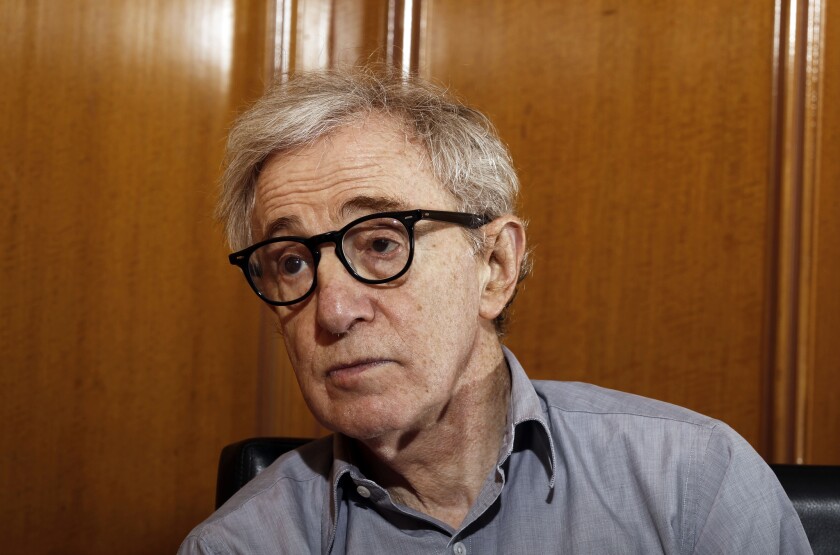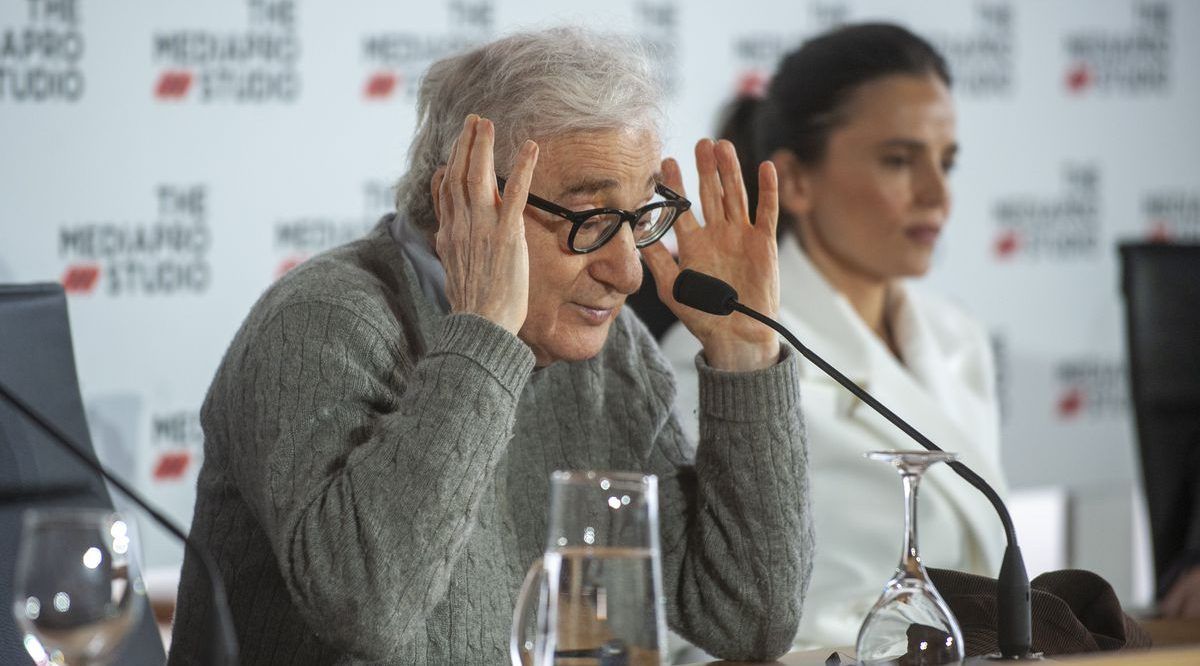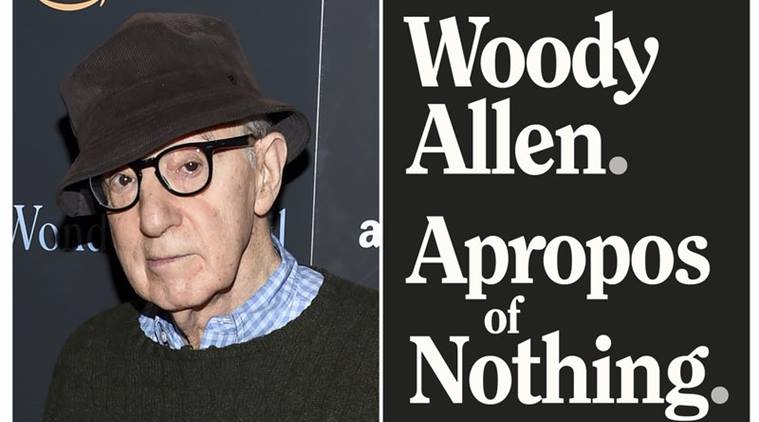- Woody Allen Memoir Reddit
- Woody Allen Memoir Publisher
- Woody Allen Memoir Amazon
- Woody Allen's Memoir Reviews
- Woody Allen Memoir April
If you’re a white, male cinephile of a certain socioeconomic background, there’s a good chance that Woody Allen established for you the archetype of what a great auteur looks like. Here was a man who wrote, directed, and often starred in his own films, with a set of recurring ideas and preoccupations, blessed with total creative control. A man of such good taste, and so indifferent to the whims of publicity, that he didn’t even bother to pick up his Oscars, preferring instead to stay in New York to play jazz with his band. A man with such high personal standards that, despite directing the likes of Annie Hall, The Purple Rose of Cairo, and Crimes and Misdemeanors, he believed he never made a truly great film.

If you discovered his films in adolescence, as I did, they offered a tantalizing glimpse into the adult world – or at least a certain vision of the adult world, where overeducated, neurotic people walked along Fifth Avenue and had dinner parties in their spacious Upper East Side apartments talking about Love, Sex, Death, and the Meaning of Life (to quote the title of a book about Allen). If you were interested in film, he was probably your gateway to Bergman, Fellini, and Rohmer. And if you were a boy who possessed a certain level of masculinity – like, let’s say you were bespectacled and skinny and bookish – well, here was the man who more-or-less established the archetype of the beta-male sex symbol.
Apropos of Nothing is a 2020 memoir by American filmmaker and humorist Woody Allen. The book was originally due to be published by Grand Central Publishing, an imprint of Hachette Book Group, in April 2020, but on March 6, 2020 Hachette said they would no longer publish it. Woody Allen’s memoir has been released after all — by a new publisher — and it details his affair with now-wife Soon-Yi Previn. After Hachette Book Group backed out of publishing Apropos of.
As you can see, Woody Allen perpetuates a lot of illusions that are ripe for shattering the second you become an adult. First of all, a 23-year-old writer like Jason Biggs’ character from Anything Else probably cannot afford an apartment on the Upper East Side. Secondly: one of the ideas that permeates Allen’s filmography is that we live in a meaningless, godless universe, and so if something offers you some happiness in this cosmic nightmare, pursue it. This is an idea worth grappling with, but you can see its darker implications in Allen’s offscreen relationship with Soon-Yi Previn, the sister to his children. And is it my imagination, or have his films since 1992 been increasingly about men justifying their irresponsible love lives? There is an unintentionally hilarious scene towards the end of Magic in the Moonlight in which Colin Firth announces to a chum that he and his fiancée have called off their engagement. Don’t worry, he says – it was amicable, and she respected his perspective, because if it doesn’t feel right, better end it now than later. The cause of the split was that Firth had fallen in love with decades-younger Emma Stone. As Alvy Singer notes in Annie Hall, “You’re always trying to get things to come out perfect in art, because it’s real difficult in life,” so the Colin Firth character was fortunate to have had a fiancée who understands that the heart wants what it wants.
So it was already possible to feel uneasy about having Allen in your DNA before Dylan Farrow’s upsetting open letter complicated the situation exponentially – a situation complicated even further by the unhappy reality that, unlike most MeToo cases, there’s a lot of compelling evidence on both sides of this one. Whatever the truth of this particular allegation, there is plenty in the Woodman’s personal life to sour him in the eyes of fans forever. So, why do I find myself unable to just leave him behind? I won’t pretend his oeuvre isn’t irreparably tainted, but… well folks, unfortunately, he has made at least a dozen movies that are absolute bangers, plus plenty of other very solid entertainments. I revisited Zelig and Crimes and Misdemeanors recently, and friends, they are very, very good.
Woody Allen Memoir Reddit

- By Woody Allen Arcade Publishing, 400 pages, $40 Let’s get it out of the way: Here’s a list of terms Woody Allen uses to refer to women in the first chapter of his new memoir, “Apropos of.
- Perspective If you’ve run out of toilet paper, Woody Allen’s memoir is also made of paper Woody Allen’s new book, “Apropos of Nothing,” is the literary equivalent of belly-button lint.
- Woody Allen's memoir 'Apropos of Nothing' was released Monday by Arcade Publishing. The book was dropped earlier this month by Hachette after much criticism.
A few months ago, I also revisited Manhattan for the first time since long before Dylan Farrow’s 2014 open letter. This is, of course, the movie in which Allen’s character dates a 17-year-old girl played by Mariel Hemingway, which has frequently been used as evidence of Allen’s improper sexual interest in teenage girls. For a long time, I thought this movie got a bad rap: after all, we’re supposed to think his character is flawed, right?
Well, upon re-visiting it, I found myself newly disquieted by the famous final scene. You will recall that Allen, freshly dumped by the more age-appropriate Diane Keaton, rushes to Hemingway’s apartment and finds her on the way out the door, off to study in London. He asks her to stay in New York, with him. Sorry, but no, she’s going – but she’ll be back soon, and maybe then they can be together. “You have to have a little faith in people,” she tells him. Now, I have never believed that Hemingway would actually return to Allen, and I don’t think the film’s writer/director does either. I think she’ll go out into the world, come into her own identity, and leave the whiny little ephebophile in the dust. I have always thought this was a good thing, but now I wonder: does Allen agree? Though only 17, Hemingway is the most mature and good person in the movie, and I wonder why Allen thinks this is. Is it because she is still young, and hasn’t been corrupted by the adult world? Does he think that by flying to London and leaving Eden, she will be irreparably soiled?
Woody Allen Memoir Publisher
To Allen’s credit, Manhattan leaves it ambiguous, but I had further cause for doubt reading Apropos of Nothing, Allen’s much-dreaded new memoir – a book that has some of the virtues that condemned me to a life as an Allenologist, plus a lot of parts that sound like they were written by Humbert Humbert.
The book is at its best in its first third, in which Allen recounts his working-class Brooklyn upbringing in the arch, witty style familiar from his classic prose collections Without Feathers, Side Effects, and Getting Even. He writes compellingly but unsentimentally of his parents, who come across as sturdy but emotionally distant, and he paints a vivid picture of skipping school to visit the museums and moviehouses of Manhattan in the ’40s. From there, he charts his evolution from a young comedy writer to a comedian to a filmmaker, his first two marriages, etc. I enjoyed these parts, but I’m not going to bother getting into too much detail because this isn’t the stuff that will tug at my conscience next time I want to watch Bananas.

Woody Allen Memoir Amazon


Woody Allen's Memoir Reviews
The book’s second half alternates awkwardly between a breezy run-through of his filmography and intense spleen-venting about the Farrow family. First, the innocuous stuff: each movie gets only a couple of paragraphs (but it adds up – he’s made 50 of them) in which he recites some well-worn stories, praises his collaborators, and gives a brief, typically downbeat assessment of the finished product. We hear repeatedly, wearyingly of how beautiful his actresses and charming his actors have been. Throughout, he works hard to downplay his talent, insisting that, for example, he favours long master-shots mostly because they’re easy, and so on. He claims to take neither praise nor criticism seriously, but documents the kudos he received from personal heroes like Ingmar Bergman, Tennessee Williams, Arthur Miller, Elia Kazan, and on and on. Two interview books, Stig Bjorkman’s Woody Allen on Woody Allen and Eric Lax’s Conversations with Woody Allen, offer better insight into his creative process, as does Lax’s recent Start to Finish, a revealing step-by-step account of the making of Irrational Man.
Woody Allen Memoir April
Meanwhile, there is a lot on Mia/Soon-Yi/Dylan, as Allen attempts nothing less than a definitive account of His Side Of The Story. He ominously describes a 12-year relationship in which he and Mia Farrow never marry, live together, sleep over at one another’s apartments, or spend summers together. Unsurprisingly, the passion leaves this union fairly quickly, but the two are bound together by both inertia and parenthood, as Allen became the adoptive father of Dylan and Moses and the (cough) biological father of Ronan. Beginning with Ronan’s birth, the relationship becomes toxic, as she develops an unhealthy attachment to the boy that all but shuts Allen out. (Here, I’ll let you in on the Allen’s juiciest allegations: Mia and Ronan slept naked in the same bed together until he was 11, and Mia persuaded Ronan to undergo grueling bone-breaking surgery to add a few inches to his height). Allen wants to leave, but fears he would be deprived access to his kids, so he sticks around, eventually bonding with 21-year-old Soon-Yi over their shared unhappiness with her mother. He learns from Soon-Yi that Mia is not the supermom she’s reputed to be, and that the non-white and adopted children have been subjected to a litany of horrors. Remarkably, Allen never noticed this in 12 years – after all, he lived across the park, and only spent time with his own children. As for Dylan’s allegation, Allen quotes extensively from the two child-abuse investigations that cleared him in the ‘90s, and from the writing of Moses, who describes how his mother could have brainwashed Dylan. My take: I don’t know if Allen is guilty of child molestation, but I do know that this is one nutty family.
Allen is eager to clear a common misconception: No, he doesn’t have an unhealthy fixation on young women. In fact, he has mostly dated age-appropriately – aside from Soon-Yi Previn, and Stacey Nelkin, and yeah, okay, that one time he asked out Mariel Hemingway (the name of Allen’s friend Jeffrey Epstein goes unmentioned) – and folks, if you had a window into their quarter-century union, you’d know that Soon-Yi is the real boss. Elsewhere, Allen writes of Soon-Yi: “Here was a sharp, classy, fabulous young woman; highly intelligent, full of latent potential, and ready to ripen superbly if only someone would how her a little interest, a little support, and, more important, some love.” He also writes that his “most satisfying achievement” was “that I was able to liberate Soon-Yi from a terrible situation and provide her with an opportunity to flower and realize her potential.” Take that, haters – time to put your words on a plate and eat them.
None of this will be surprising to those of us who have wasted chunks of our lives studying the Allen/Farrow family, and one of the disappointments of Apropos of Nothing is that for an attempt to Set The Record Straight, too much of it smacks of the same old bullshit. To an outside observer, it would seem that the embattled auteur launched an aggressive charm offensive in the ‘90s: reuniting with Diane Keaton for Manhattan Murder Mystery, lending his voice to a DreamWorks cartoon, and allowing himself to be the subject of Wild Man Blues (1997), a feature-length attempt to normalize the Woody/Soon-Yi union. But to hear Allen tell it, Diane Keaton happened to be available, and Antz was just a favour to Jeffrey Katzenberg, and gosh, all of a sudden Barbara Kopple was documenting his European jazz tour. Allen struggles mightily to affect this disinterested posture in the dreary final pages, which bring us to the #MeToo years. He is not too troubled by the ill-informed actors who have publicly disavowed him, he insists, but he thanks all the ones who have defended him by name. He also spends a few paragraphs thanking Robert B. Weide, the director who has made it his mission to advocate for Allen’s innocence, and chides the New York Times for its negative coverage of him, but notes that Bret Stephens was an exception. Passages like these cast a lot of doubt on his oft-repeated claim that he never reads his own press. Apropos of Nothing is plenty revealing, but I wish it was a little more candid.
The new European data protection law requires us to inform you of the following before you use our website:
We use cookies and other technologies to customize your experience, perform analytics and deliver personalized advertising on our sites, apps and newsletters and across the Internet based on your interests. By clicking “I agree” below, you consent to the use by us and our third-party partners of cookies and data gathered from your use of our platforms. See our Privacy Policy and Third Party Partners to learn more about the use of data and your rights. You also agree to our Terms of Service.
